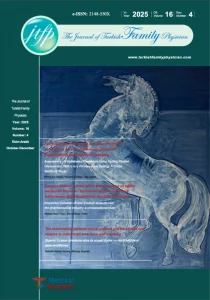The Effect Of Pregnancy Over Sexual Life
Pregnancy and labor (birth) are the most important periods in the lives of women. Hormonal, physical and psychiatric changes are effective on woman’s general health, mood, relationships and sexuality. The aim of our study was to determine the effects of pregnancy on sexual life in pregnant women followed up in primary care and it is a cross-sectional study. Pregnant women who have high risk pregnancy, who divorced from her husband, who use psychiatric or systemic drugs were excluded from the study. From 86 pregnant women who admitted to the Hatay Province Narlıca Family Health Center between 1 October-1 November 2011 period, 79 were included in the study. In women participating the study week of pregnancy was 22.6 ± 8.8 weeks, mean age was 24.6 ± 4.7 years, weight was 63.4 ± 9.7 kg, mean height was 160.7 ± 4.8 cm. Nineteen percent of pregnant women were in the first-trimester, 45.6% in the second and 35.4% were in the third trimester. 67.1% of pregnant women participating in the study were complaining from pain during sexual intercourse. With progress in the trimester of pregnancy, the number of pregnant women complaining from dyspareunia was increasing. While the frequency of sexual intercourse during the prepregnancy period was more than 2 times per week and 2 times per day in 77.3 % of cases, the rate was dropped to 49.4% during the pregnancy period. While there was no cases who cannot orgasm during the pre-pregnancy period, this proportion rose to 30% during the pregnancy period. In our comparison about average libido scores, the average libido score during the pre-pregnancy and pregnancy periods were 7.1 and 5.5, respectively. The average libido scores during pregnancy were significantly decreasing (p= 0.001). For the first, second and third trimester average libido scores were 6.2, 5.7, 5.0, respectively. As trimester progresses, the average libido score significantly decreases. Following the findings this study, during pregnancy period; the frequency of intercourse and orgasm are significantly decreasing while the partner starting the sexual intercourse and the rate of masturbation are remaining the same.
References
- Güleç C, Köroğlu E. “Psikiyatri Temel Kitabı” Cilt 2. 2. baskı, Ankara. 1998:605-610.
- Lowedermilk DL, Bobak JM, Perry SE. “Maternity and Women’s Healthcare.” 2nd ed. St Louis, Mosby. 1996:51-56.
- Yüksel N. “Ruhsal Hastalıklar”, 3.baskı, Ankara. 2006:447-461.
- Von Sydow K. Sexuality during preagnancy and after childbirth: a metacontent analysis of 59 studies. J Psychosomatic research 1999; 47:27-49.
- Onah HE, Iloabachie GC, Obi SN, Ezugwu FO, Eze JN. Nigerian male sexual activity during pregnancy. Int J Gynecol&Obs 2002; 76: 219-223.
- Aslan G, Aslan D, Kızılyar A, İspahi Ç, Esen A. A prospective analysis of sexual functions during pregnancy. Int J Impotence Research 2005; 17: 154-157.
- Oruç S, Esen A, Laçin S, Adıgüzel H, Uyar Y, Koyuncu F. Sexual behavior during pregnancy. Aust NZJ Obstet Gynaecol 1999; 39:48-50.
- Sydow KV. Sexuality during pregnancy and after childbrith: A metacontent analysis of 59 studies. Journal Psychosomatic Research 1999; 47:27-49.
- Naim M, Bhutto E. Sexuality during pregnancy in Pakistani women. J Pak Med Assoc 2000; 50: 38-44.
- Gökyıldız Ş, Beji NK. Gebeliğin Cinsel Yaşam Üzerindeki Etkileri. İ.Ü. Sağlık Bilimleri Enstitüsü. Yüksel Lisans Tezi, 2001.
- Eryılmaz G, Ege E, Zincir H. Gebelikte cinsel yaşamı etkileyen faktörlerin İncelenmesi. CETAD Günleri-II, 24-26 Kasım 2000. İstanbul, Kongre kitabı. 2000:21-22.
- Masters W, Jhonson W. “Human Sexual İnadequacy”. Vol 3. 1nd ed. London, Churchill. 1970; 101-102.
- Solberg DA, Butler J, Nathaniel N. Sexual Behavıor in Pregnancy. NEJM 1973; 288: 1098-1103.



